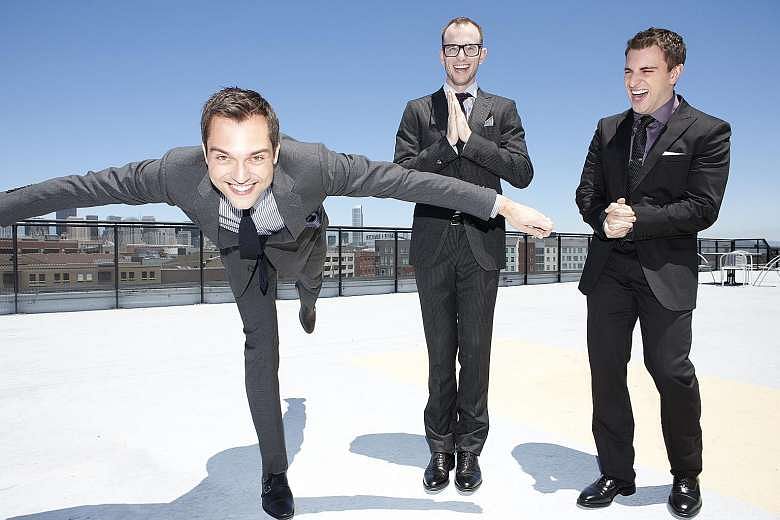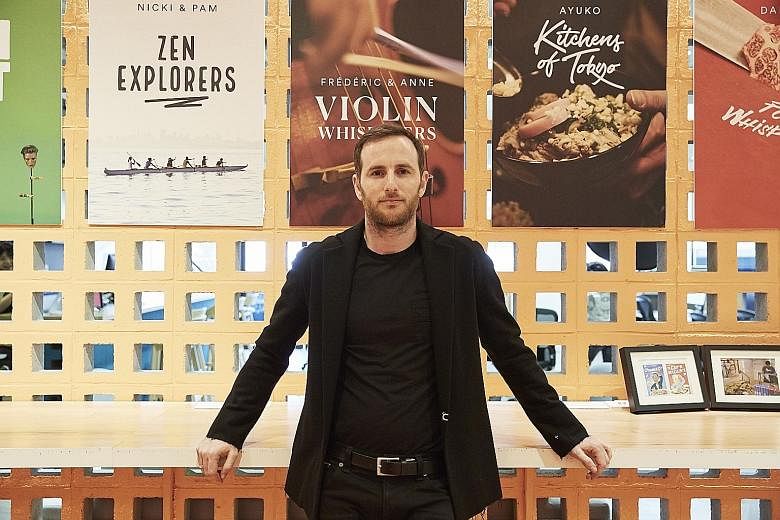It was November 2010. As he was wont to do every day, Joe Gebbia logged onto Airbnb - the peer-to-peer homesharing site he co-founded two years earlier - to check out new listings.
One caught his eye: a private island in Fiji.
"I went: 'What?' So I clicked on the photos and true enough, this guy has a 300-acre private island and he's renting it out for US$500 (S$700) a night and it could sleep 10 people."
That was, he says, the pivotal moment when he saw the power of the site, then still in its infancy.

"You create a platform, people join it, and they bring a lot of creativity which you never imagined," says the 35-year-old.
Soon, there were listings for castles, treehouses, villas and yurts. From having just several thousands in 2010, Airbnb now boasts three million listings in 191 countries.
"It's crazy. To have an idea in your living room, and nine years later, to have that idea in three million homes around the world, well, it's a pretty profound thing," says Airbnb's co-founder and chief product officer.
The idea for the business, now valued at a staggering US$30 billion, started in 2007. He and his business partner were struggling entrepreneurs, about to be booted from their apartment because they could not pay the rent. Mr Gebbia then hit on the idea of renting out airbeds in their living room, with breakfast thrown in.
Defying investors and naysayers who dismissed it as a hare-brained scheme, Airbnb has since hosted 150 million guests in 65,000 cities around the world. It has also made the founders very rich. Mr Gebbia, according to Forbes, is worth US$3.8 billion.
The technopreneur was in town last week to launch Airbnb Trips, a new initiative offering insider guides and events designed and led by locals to guests staying with Airbnb and those who are not on the platform.
At the vibrantly designed Airbnb Asian headquarters spanning three levels of a Shenton Way building, he cuts a stylish figure: short beard immaculately trimmed, and a lithe frame clad in a modish all-black ensemble of T-shirt, jeans and jacket.
The elder of two children, he grew up in Atlanta, Georgia. His parents ran a health and nutrition business and encouraged him to pursue whatever he loved doing. His entrepreneurial skills surfaced early.
"In third grade, I was drawing Teenage Mutant Ninja Turtles and selling them to classmates for $2. The business did so well that parents complained to teachers that their kids were asking for extra lunch money and they didn't know why," he says with a grin.
Fuelled by dreams of living the life of an artist in New York City, he enrolled in the Rhode Island School of Design (RISD) in 2000. That changed when as a freshman he discovered industrial design, the art of designing objects for manufacture.
"It was a wonderful moment when the realisation hit that the world around you is designed by someone and that you could have a say in that as well," says Mr Gebbia, who switched his major from fine arts to industrial design.
He was especially inspired by Charles and Ray Eames, the husband-and-wife American designers who left their mark in areas ranging from furniture to architecture. Their vision of design as an agent of social change enthralled him.

The day after he graduated in 2005, he started Critbuns, a company to launch a portable butt pad - yes, an ass cushion - he had created. The name was inspired by the long hours design students sit around critiquing one another's works in front of teachers and peers.
"These 'crits' can be very uncomfortable, you're seated for hours on metal stools or hard floors. At the end of the day, when you stand up, your pants have this bun print from all the art materials - charcoal dust and ink - used."
Because Critbuns won a design competition on campus, RISD paid for its initial development. Setting up the company taught him a lot about resilience and how to deal with rejection.
"The first store I walked into was the Brown University bookstore in Providence. I sat down with the store manager, I had my best shoes on and my sales sheets all prepared. In 30 seconds, she said 'I'm not interested' and walked out of the room. I sat there, crushed."
As he walked home, he recited an equation for rejection that one of his professors taught him.
"It's SW(square)+WC=MO," he says, scribbling in my notebook. "When you have a new idea, some will love it but some won't plus who cares equals move on."
Move on he did. Because of his persistence, the butt pads were soon sold in stores throughout the United States, including the one all designers lust after: the gift shop at New York's Museum of Modern Art.
As a business, Critbuns, he says, was "ramen profitable" - "just enough to make rent and ramen".
Not long after, he started another "mildly successful" online business called Ecolect. It was a website for designers looking for eco-friendly raw materials for their products.
"I feel tremendous responsibility to design a world which is better for my kids, not worse," says Mr Gebbia, who is single.
However, he found that the money he earned from his two start-ups was not adding up. In 2007, he decided to leave Providence and move to San Francisco to be "near the epicentre of the Internet and entrepreneurship". He persuaded his best friend Brian Chesky, a fellow RISD graduate working in Los Angeles, to join him so that they could start a business together.
Life changed in the most unexpected way.
In the same week that the two friends quit their jobs, the landlord raised the rent of their loft apartment by 20 per cent. Both broke, they started scrambling for ways to save their apartment. One day, while sitting in his living room surfing on his laptop, he found that all hotel rooms in the city were booked because of a major design conference.
"And I was thinking to myself: 'What a bummer, anyone who wants to attend won't be able to.' As I did, I looked over the top of my laptop into the rest of the living room and I saw a couch, a desk and a whole bunch of floor space."
He told Mr Chesky about an airbed he had in his closet and his idea of "making a few bucks" by renting out the space in their living room. He also went out to buy two more US$20 airbeds and built a website called Airbed and Breakfast.
The idea got press in the design community and attracted dozens of enquiries from all over the world.
"Our first three guests were Kat, Michael and Amol. We introduced them to our friends, took them to our favourite coffee places and burrito spot for Mexican food. We charged them just US$80 a night - it was a real steal," he says.
There's a reason why hosting strangers was not a crazy idea for Mr Gebbia. A couple of years earlier, he organised a yard sale and befriended a stranger who bought one of his paintings. The man was driving across the country in a red Mazda Miata before joining the Peace Corps.
Mr Gebbia ended up inviting him for a beer, and agreed to let him spend the night on an airbed in the living room since the latter did not have a place to stay.
"That night, at about 2am, I tip-toed to my bedroom door and locked it because...," he says, voice dramatically trailing into a whisper, "there's a stranger in my house and what if he's psychotic?"
But the man, who is now a teacher, was not psychotic. In fact, the two became good friends. The experience changed his perspective. Strangers, he reckons, are perhaps friends waiting to be made.
Back in their San Francisco apartment, Mr Gebbia remembers exchanging looks with Mr Chesky after the departure of their first three guests. "Is it really possible to get paid for making friends?"
The wheels began to turn. A few months later, they roped in their engineer friend Nathan Blecharczyk to become their third co-founder and chief technology officer.
Getting Airbnb off the ground was tough. The investors they approached - folks who had invested in Google and Paypal and Facebook - told them it was a horrible idea.
"No one in their right mind would invest in a scheme which allows strangers into their homes. They couldn't imagine what we could - that if you could break down that bias or at least put a dent in it, you could create a pathway for people to connect with each other from different languages and cultures."
To keep it going, they chalked up credit card debt amounting to tens of thousands of dollars. They even resorted to selling politically themed cereal boxes - Obama O's and Captain McCains - during the 2008 US presidential campaign.
Their doggedness paid off when the Y Combinator - which provides seed funding for start-ups - accepted them into its accelerator programme. One of the things which was stonewalling their success, they discovered, was the lack of professionally taken photographs.
They hit the streets, offering to take free photos of homes of the best sellers in the best markets. They also spent a lot of time interviewing their community members to find out what worked and what didn't.
Mr Gebbia candidly admits to having doubts. "But at some point, you have to be unreasonable with yourself and the product. You have to suspend your logic for a certain amount of time to break through to the other side. If you just relied on logic, spreadsheets would have told you to stop working on this and find something else to do.
"But we knew that, only because we did it ourselves, the experience was magical and if we just kept going, other people would see the greatness too."
In 2009, Sequoia Capital - a blue chip venture capitalist in Silicon Valley - invested US$600,000. The team has not looked back since. To date, the company has raised more than US$3 billion in funding.
Airbnb, says Mr Gebbia, is now in the next lap, rolling out initiatives to show that it is not a one-trick pony. Last year, it collaborated with Japanese architect Go Hasegawa on a project in Yoshino, a rural village affected by ageing population and urbanisation. The Yoshino Cedar House, a community centre merged with Airbnb, was designed to foster a connection between guests and the villagers and their traditions.
"You are physically sharing space with the guy who runs the sake brewery or the woman who works in the chopsticks factory. Instead of an individual host, you get to interact with the people in the village."
Proceeds from hosting guests go into a community investment fund used to help needy groups.
The company's latest initiative is Airbnb Trips.
"We are taking Airbnb's values of great design, guest-host relationships, global community and trust between strangers and imbuing those values not just in the accommodation but in the entire trip."
In Singapore, Airbnb users can sign up for, among others, a dumpling making course by a hawker in Jalan Besar or pottery classes at one of the city's last dragon kilns.
Last year, Mr Gebbia and his partners made headlines by joining the Giving Pledge, created by Bill and Melinda Gates and Warren Buffet to spur charitable giving. Members promise to give a big portion of their wealth to philanthropic causes.
He shrugs when asked why.
"We're incredibly lucky. It's a one in a million shot that you can have an idea and turn it into a global business. All of us are interested in giving back. We can take whatever success we have and give it back to put it into causes we really care about."


